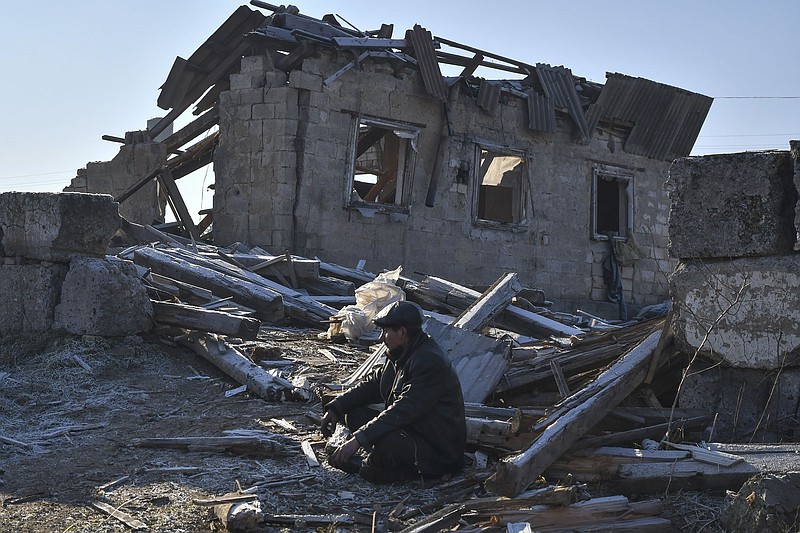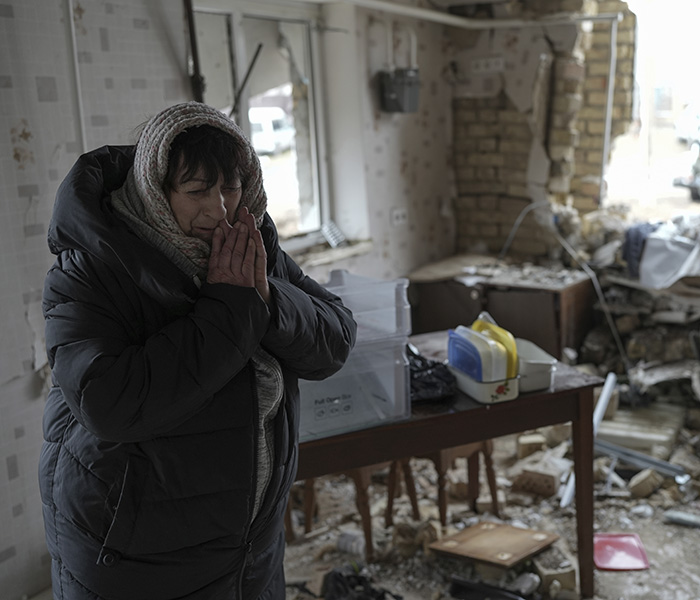KYIV, Ukraine -- Russia fired more missiles and self-exploding drones at nearly a dozen Ukrainian provinces early Thursday, causing the first war-related death in Kyiv this year and killing at least 11 people overall, according to Ukrainian authorities.
The attacks adhered to Russia's recent pattern of striking power plants and other critical infrastructure about every two weeks. However, the latest onslaught came after Germany and the United States upped the ante in Russia's 11-month war by promising Wednesday to send high-tech battle tanks to Ukraine and green-lighting other allies to do the same.
The spokesman for Ukraine's State Emergency Service, Oleksandr Khorunzhyi, said that in addition to the dead at least 11 people were wounded.
Kyiv Mayor Vitali Klitschko said one person was killed during the attacks, the city's first such death since New Year's Eve. Two others were injured, he said. The head of the Kyiv city administration, Serhii Popko, said Ukrainian air defenses shot down 15 cruise missiles heading to the area.
The regional prosecutor's office in Ukraine's Zaporizhzhia province said three people were killed and seven injured in a strike on an energy facility. Valerii Zaluzhnyi, the commander of Ukraine's armed forces, said Thursday's volley involved a total of 55 missiles, of which 47 were intercepted.
Self-exploding drones swept in overnight before the missile strikes. As air raid sirens echoed across the country, civilians, some tugging pet dogs on leashes, poured into subway stations, underground parking lots and basements to seek shelter.
It was the first such barrage of Russian firepower across the country since Jan. 14.
Russia has carried out massive strikes on Ukrainian energy facilities since early October, part of a strategy to try to hamper Ukrainian forces and to keep civilians in the cold and dark this winter before what many experts predict could be a springtime offensive as more conscripts reach the battlefields.
Ukrainian Energy Minister Herman Halushchenko acknowledged that some sites were hit, resulting in emergency power failures.
In Kyiv's southern Holosiivsky district, Arkadii Kuritsyn, 53, said he heard a loud explosion that blew out windows of several trucks parked next to his scrap metal business and snapped several trees in a nearby wooded area in half.
But the strikes did not reach what appeared to be the intended target: a nearby district power plant. The industrial area has witnessed several missile attacks already, due to its proximity to the power station, said Andrii Tarasenko, 36, who works in a factory nearby.
"I am not surprised it was targeted again," he said. "We've gotten used to it."
In Hlevakha, an urban area about 22 miles southwest of the capital, a barrage of missiles followed a drone attack that damaged the two-story home of Halyna Panasian. The damage included a deep crater in the courtyard, a large hole in the roof and pieces of debris scattered about the house.
"I was in my bedroom when the house was hit. I had to crawl out through the destroyed walls," Panasian, 59, said of the blast at about 2 a.m. "Such grief: What can I say? How can I have a happy life now? I can't. I'm so sad. My life is broken."
The attacks came a day after Germany said it would supply 14 high-tech Leopard 2 battle tanks to Ukraine and authorize other European countries to send up to 88 more. The U.S. said it planned to ship 31 Abrams M1 tanks to Ukrainian forces.
Along with Germany and the U.S., Britain, Poland, the Netherlands and Sweden are among the nations that have sent or announced plans to supply hundreds of tanks and heavy armored vehicles to fortify Ukraine as it enters a new phase of the war and tries to break through entrenched Russian lines.
Gian Gentile, a U.S. Army veteran and senior historian with the Rand think tank, said the M1 Abrams and the Leopards would give Ukraine a "mechanized armored punching force."
The British government said Thursday it would start training Ukrainian troops next week on how to use and fix Challenger 2 tanks. The U.K. is giving 14 of the tanks to Ukraine's forces, and Defense Minister Alex Chalk said they should arrive in Ukraine by the end of March.
German Defense Minister Boris Pistorius said Ukrainian crews will start their training in Germany in coming days on German-made Marders, which are infantry fighting vehicles, while training on the heavier Leopard 2 tanks would start "a little later."
"In any case, the aim with the Leopards is to have the first company in Ukraine by the end of March, beginning of April," he added. "I can't say the precise day."
NATO Secretary-General Jens Stoltenberg declined to speculate on the timing of the tanks' arrival but told Britain's Sky News the "allies are extremely focused on the importance of speed."
Kremlin spokesman Dmitry Peskov said the move to provide Ukraine with modern tanks reflected the West's growing involvement in the conflict.
"Both European capitals and Washington keep saying that the delivery of various kinds of weapons systems, including tanks, to Ukraine, absolutely does not mean the involvement of these countries or the alliance in the hostilities ongoing in Ukraine," Peskov told reporters. "We categorically disagree with that."
"Moscow views everything that has been done by the alliance and the capitals I have mentioned as direct involvement in the conflict," he added. "We can see it growing."
French Foreign Minister Catherine Colonna, who happened to be in Ukraine's Black Sea port city of Odesa on Thursday, in part to meet with Ukraine's foreign minister, told France's LCI television that Thursday's attacks went beyond retaliation.
"What we saw this morning -- that is, new strikes on civilian installations -- that is not making war. It is making war crimes."
EXPANDING U.S. SANCTIONS
The Biden administration on Thursday expanded U.S. sanctions against Russia's Wagner Group and related companies and individuals for their role in the war in Ukraine and mercenary activities, including human rights abuses, in Africa.
The Treasury and State departments announced the moves in coordinated statements that target dozens of Wagner Group affiliates, including some in the Central African Republic and the United Arab Emirates, as well as the president of Russia's Kalashnikov Concern, the original manufacturer of the AK-47 assault rifle.
The sanctions also hit the Chinese company Changsha Tianyi Space Science and Technology Research Institute Co. LTD, also known as Spacety China, which has supplied Wagner Group affiliates with satellite imagery of Ukraine that support Wagner's military operations there. A Luxembourg-based subsidiary of Spacety China was also targeted.
The announcements re-designate the Wagner Group, a private Russian military group owned by a close associate of President Vladimir Putin, as a "significant transnational criminal organization." The firm had already been identified as such but the re-designation expands the sanctions.
The sanctions freeze any assets those identified may have in U.S. jurisdictions and bar Americans from conducting business with them by adding a number of affiliates to American blacklists.
"As sanctions and export controls on Russia from our international coalition continue to bite, the Kremlin is desperately searching for arms and support -- including through the brutal Wagner Group -- to continue its unjust war against Ukraine," Treasury Secretary Janet Yellen said in a statement.
"Today's expanded sanctions on Wagner, as well as new sanctions on their associates and other companies enabling the Russian military complex, will further impede Putin's ability to arm and equip his war machine," she said.
A total of eight people, 16 companies and four specific aircraft were sanctioned by Treasury. In addition, the State Department imposed separate but related sanctions on five companies and one person linked to the Wagner Group and 23 others for being part of Russia's military-industrial complex.
The State Department also placed 531 members of the Russian military on a travel blacklist for actions that threaten or violate the sovereignty, territorial integrity or political independence of Ukraine.
"This action supports our goal to degrade Moscow's capacity to wage war against Ukraine, to promote accountability for those responsible for Russia's war of aggression and associated abuses, and to place further pressure on Russia's defense sector," Secretary of State Antony Blinken said.
AMBASSADOR TO RUSSIA ARRIVES
The United States' new ambassador to Russia, Lynne Tracy, has arrived in Moscow, the U.S. embassy said Thursday.
Tracy most recently was the ambassador to Armenia and served as the deputy chief of mission in Moscow in 2014-2017. She replaces John Sullivan, who resigned in September.
It was not immediately clear when Tracy would present her credentials.
Her arrival comes amid high tension between Russia and the United States, most recently sharpened by President Joe Biden's decision Wednesday to supply advanced Abrams battle tanks to Ukraine. In recent years, staffing at the embassy in Moscow has been significantly reduced, obstructing visa applications and other consular services.
Information for this article was contributed by Hanna Arhirova, Samya Kullab, Matthew Lee and staff writers of The Associated Press.
Gallery: Aftermath of Russian missile attack



